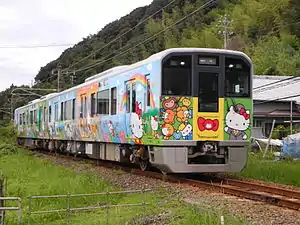Smart BEST
The Smart BEST is an experimental Japanese two-car self-charging battery electric multiple unit (BEMU) train developed and manufactured by Kinki Sharyo in 2012 to demonstrate the feasibility of battery train technology for use on non-electrified rural lines.[1] The name is an acronym for "Battery Engine Synergy Train".[1] The train has been tested on JR West and JR Shikoku lines since late 2012.[1][2]
| Smart BEST | |
|---|---|
 The Smart BEST train in service in "Hello Kitty" livery, September 2014 | |
| Manufacturer | Kinki Sharyo |
| Built at | Osaka |
| Constructed | 2012 |
| Number built | 2 vehicles (1 set) |
| Formation | 2 cars per trainset |
| Capacity | 259 per set |
| Specifications | |
| Car length | 20,000 mm (65 ft 7 in) |
| Width | 2,950 mm (9 ft 8 in) |
| Floor height | 1,120 mm (3 ft 8 in) |
| Doors | 3 pairs per side |
| Maximum speed | 100 km/h (62 mph) |
| Acceleration | 2.3 km/(h⋅s) (1.4 mph/s) |
| Deceleration | 3.1 km/(h⋅s) (1.9 mph/s) |
| Electric system(s) | Battery |
| Bogies | KD318 (motored), KD318A (trailer) |
| Track gauge | 1,067 mm (3 ft 6 in) |
Overview
The Smart BEST train operates using GS Yuasa LIM30H-8A lithium-ion storage battery modules[3] recharged in operation by a small-capacity "e-Brid Plus" diesel engine.[4] The train normally operates at a maximum speed of 70 km/h (43 mph), but is capable of 100 km/h (62 mph) over short distances.[4]
Formation
The two-car train is formed as shown below, with one motored (M) car and one non-powered trailer (T) car.[4]
| Designation | Mc | Tc |
|---|---|---|
| Numbering | DGBC2A-1 | DGBC2B-1 |
| Passenger capacity (total/seated) | 129/52 | 130/51 |
Interior
Seating accommodation is arranged as 2+2 abreast transverse seating with seat backs that flip over to face the direction of travel.[4]
History
.jpg.webp)
The "Smart BEST" train was unveiled to the media in October 2012 at the Kinki Sharyo factory in Osaka,[4] before being moved to Yonago, Tottori for test running on the Sanin Main Line, Sakai Line, and Hakubi Line.[5][6] It was returned to Kinki Sharyo in December 2012.[7] In December 2013, the train was moved to Takamatsu, Kagawa, and started test running on a number of lines in Shikoku, including the Kōtoku Line, Naruto Line, and Tokushima Line.[2]
From September until December 2014, the train was used in revenue service on promotional "Hello Kitty" services in the Wakayama area.[8]
See also
- NE Train, an experimental battery railcar tested by JR East
- EV-E301 series, a BEMU set operated by JR East on the Karasuyama Line since 2014
- BEC819 series, an AC BEMU operated by JR Kyushu since 2016
- EV-E801 series, an AC BEMU operated by JR East on the Oga Line since 2017
References
- "近畿車輛バッテリー電車"Smart BEST"を開発" [Kinki Sharyo develops "Smart BEST" battery train]. Tetsudō Daiya Jōhō Magazine (in Japanese). Vol. 41, no. 344. Japan: Kōtsū Shimbun. December 2012. pp. 70–71.
- "「Smart BEST」が高徳線で試運転" ["Smart BEST" test run on Kotoku Line]. Japan Railfan Magazine Online (in Japanese). Japan: Koyusha Co., Ltd. 6 December 2013. Retrieved 6 December 2013.
- "GSユアサのLiイオン2次電池、近畿車輛のバッテリ電車「Smart BEST」に採用" [GS Yuasa Li-ion batteries to be used in Kinki Sharyo "Smart BEST" battery train]. Tech On (in Japanese). Japan: Nikkei Business Publications, Inc. 21 December 2012. Retrieved 6 December 2013.
- "近畿車輛が開発した非電化路線用バッテリ電車「Smart BEST」" ["Smart BEST" battery EMU developed by Kinki Sharyo for non-electrified lines]. Japan Railfan Magazine (in Japanese). Vol. 53, no. 621. Japan: Koyusha Co., Ltd. January 2013. pp. 62–63.
- ""Smart BEST" 甲種輸送" ["Smart BEST" moved]. RM News (in Japanese). Japan: Neko Publishing. 24 October 2012. Retrieved 7 January 2013.
- 近畿車輛株式会社が開発した自己充電型バッテリー車両の走行試験について [Test running of battery train developed by Kinki Sharyo]. Press release (in Japanese). Japan: West Japan Railway Company. 30 October 2012. Archived from the original on 6 June 2013. Retrieved 20 September 2014.
- ""Smart BEST" 甲種輸送で返却される" ["Smart BEST" returned]. RM News (in Japanese). Japan: Neko Publishing. 13 December 2012. Retrieved 7 January 2013.
- 快速“ハローキティ和歌山号”運転開始 [Rapid "Hello Kitty Wakayama" service starts]. Japan Railfan Magazine Online (in Japanese). Japan: Koyusha Co., Ltd. 16 September 2014. Retrieved 16 September 2014.
External links
- Kinki Sharyo press release (October 2012) (in Japanese)